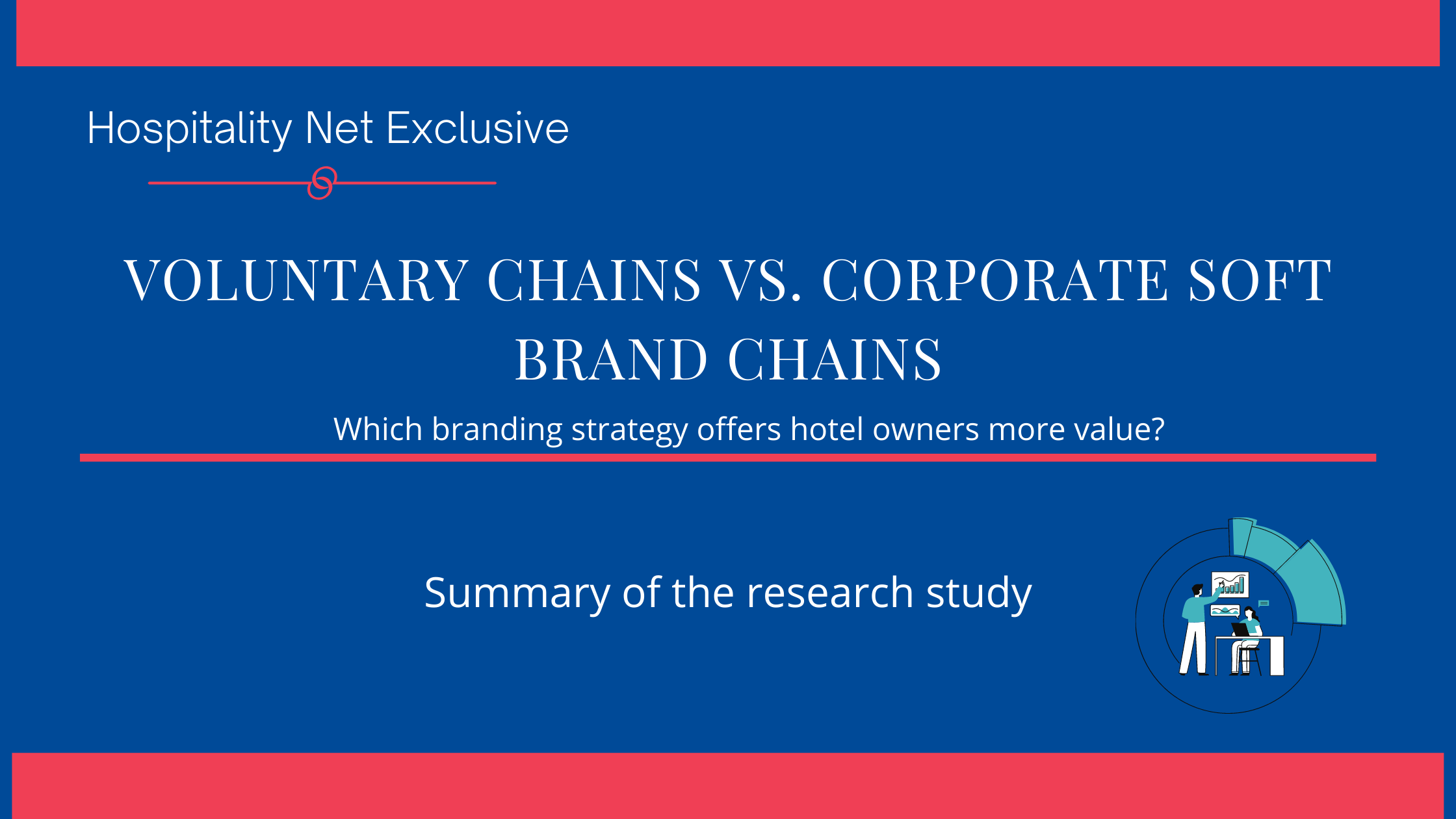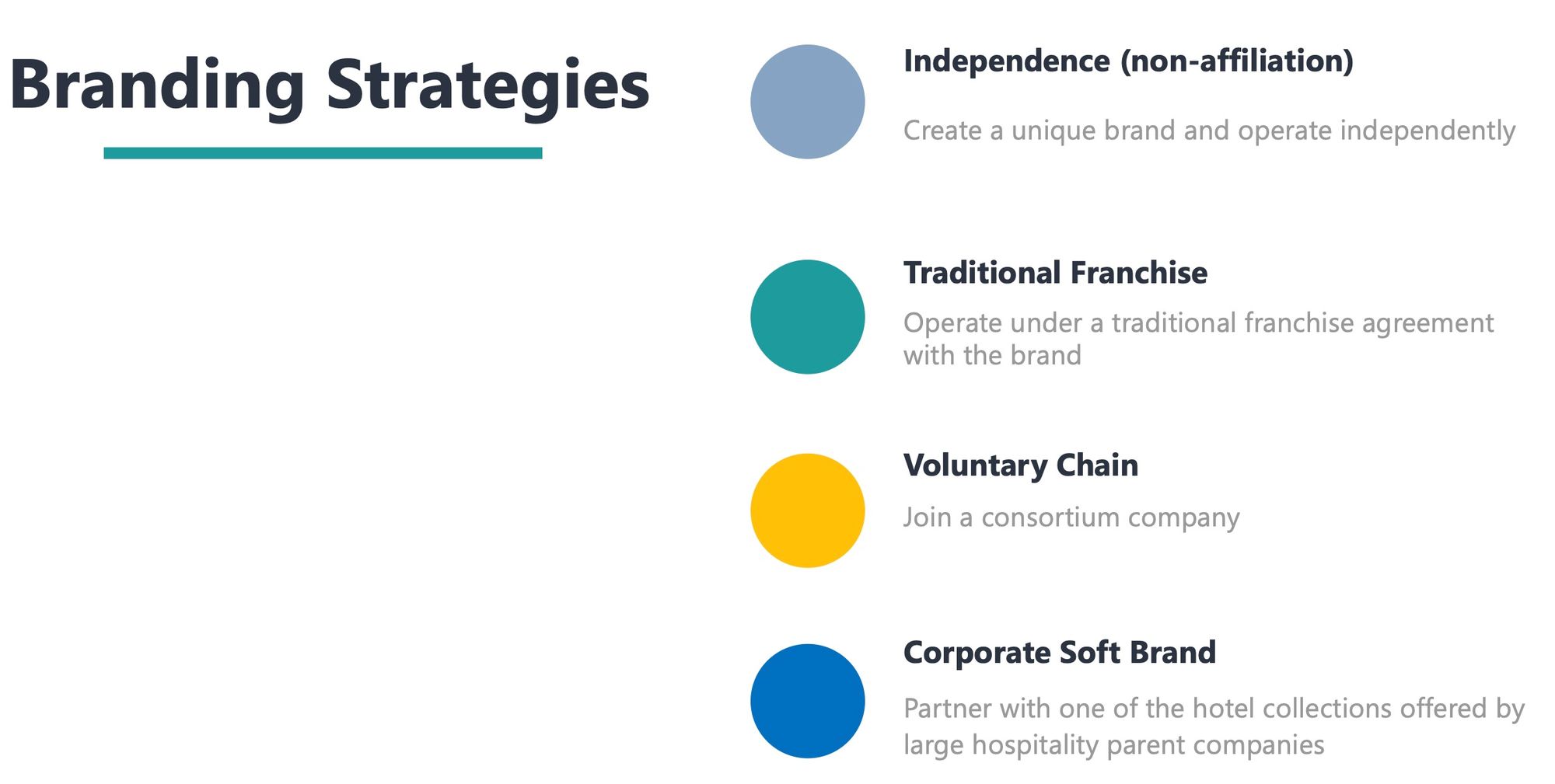
Hospitality Net exclusive: Voluntary chains vs. Corporate soft brand chains
Summary of the research study that aimed to identify which branding strategy offers hotel owners more value.
In the hospitality industry, brands play a vital role in reducing the perceived high risk of buying a service (Bailey & Ball, 2006). Customers use hotel brands to understand the benefits of staying in a particular hotel and choose a familiar brand when they do not know details about all available hotel choices in the destination (Kwortnik, 2011). Suppose customers believe the brand has a reputation for providing quality service at a reasonable price. In that case, they will conclude that the hotel under that brand will perform according to those expectations (Dev, 2015). These are some of the reasons why hotel owners have been partnering with the brands.
In the modern hotel industry, the hotel owners can choose from different branding options: Independence (non-affiliation), traditional franchise, and soft brand that includes voluntary chains and corporate soft brand chains.

Much previous literature focused on researching the performance of branded and unbranded hotels, comparing two branding strategies: non-affiliation and traditional franchise (Carvell, Canina, & Sturman, 2016; Dev, 2015; Dick, 2019; Enz & Canina, 2011; Hua, O’Neill, Nusair, Singh & DeFranco, 2017; O'Neill & Carlbäck, 2011). Most of the research in the past ten years has been focused on the impact of branding on hotel performance, hotel value, investment value, the effect of social media on hotel performance, and franchisors' ability to impact value (Dick, 2019).
Most of the hospitality industry research was dedicated to franchising companies, and consortia were mentioned to a limited extent (Line & Runyan 2011). Consortia is still the least researched affiliation format (Dick, 2019). Most recent literature reviewed on the topic referred to this affiliation model as "soft brand" (Russell & Kim, 2018; "Skift Report", 2018; Stone, 2018).
There are two main types of soft brands: Voluntary chains and corporate soft brand chains.
Voluntary chains such as Leading Hotels of the World and Preferred Hotels & Resorts include small independent properties with a collection branding that operate as its own and do not have other brands alongside the soft brand (Powell, 2017).
The corporate soft brand chains such as Ascend, Curio, Autograph, and Luxury collections proposed by international hotel companies (Marriott, Hilton, Choice) that have multiple other brands operating alongside the soft brand (Russell & Kim, 2018).
Some previous literature addressed the differences in value between affiliation with a traditional franchise and a soft brand (Carlbäck, 2015; Holverson & Revaz, 2006; Russell & Kim, 2018; "Skift Report", 2018; Stone, 2018). However, the literature reviewed had limited differentiation of the value propositions of the soft brand's two main types: Voluntary chains and corporate soft brand chains.
For the hotel owners who value independence and do not wish to enter into the traditional franchise agreement, affiliation with the soft brand could be a good alternative. The soft brand offers the best of two worlds - independence and brand support. When choosing the soft brand, the hotel owner needs to know whether an affiliation with a voluntary chain or corporate soft brand offers more value. Although relevant, this issue has not been studied in extant pieces of literature.
Thus, the purpose of this study is to identify through research of value propositions if a hotel owner will receive more value from affiliation with a voluntary chain or corporate soft brand chain and how individual value propositions of these brands compare to one another.
To examine the differences in these two branding strategies' value propositions, I used three approaches:
- Compared key performance indicators of hotels affiliated with voluntary chains and corporate soft brand chains using t-Test.
- Compared the hypothetical hotel's net operating income and market value affiliated with voluntary chain versus hypothetical hotel affiliated with the corporate soft brand chain using the Direct Capitalization valuation method.
- Compared various value components of the seven representatives of voluntary and corporate soft brand chains using a value measurement scale.

Results of the research were published exclusively on Hospitalitynet.org, the #1 ranked global hospitality website.
Please follow this link to read the full summary of the research study.
References
Carlbäck, M. (2015). Brand Value Attributable to Affiliation (BVAA) - a Method for Measurement in a Consortium Context. Unpublished manuscript, Gothenburg, Sweden. Retrieved from http://ejtr.vumk.eu/index.php/forthcoming-articles/654-v2310/
Bailey, R., & Ball, S. (2006). An exploration of the meanings of hotel brand equity. The Service Industries Journal, 26(1), 15-38. doi: 10.1080/02642060500358761
Carvell, S. A., Canina, L., & Sturman, M. C. (2016). A comparison of the performance of brand-affiliated and unaffiliated hotel properties. Cornell Hospitality Quarterly, 57(2), 193-201. doi: 10.1177/1938965516631014
Dev, C. S. (2015). Hotel brand conversions: What works and what doesn't. Cornell Hospitality Report, 15(21), 3-11. Retrieved from https://scholarship.sha.cornell.edu/chrpubs/224/
Dick, T. J. (2019). The impact of branding on hotel sales prices: A study of upper upscale and luxury hotel properties from 2007 through 2017. Graduate Theses and Dissertations. Iowa State University. Retrieved from https://lib.dr.iastate.edu/etd/17000/
Enz, C. A., & Canina, L. (2011). A comparison of the performance of independent and franchise hotels: The first two years of operation. Cornell Hospitality Report, 11(21), 6-13. Retrieved from https://scholarship.sha.cornell.edu/chrpubs/47/
Holverson, S., & Revaz, F. (2006). Perceptions of European independent hoteliers: Hard and soft branding choices. International Journal of Contemporary Hospitality Management, 18(5), 398-413. doi: 10.1108/09596110610673538
Hua, N., O’Neill, J., Nusair, K., Singh, D., & DeFranco, A. (2017). Does paying higher franchise fees command higher RevPAR?. International Journal of Contemporary Hospitality Management, 29(11), 2941-2961. doi: 10.1108/IJCHM-02-2016-0060
Kwortnik, R. J. (2011). Building and managing your brand. The Cornell School of Hotel Administration on Hospitality. Hoboken, NJ: John Wiley & Sons, 388-404.
Line, N. D., & Runyan, R. C. (2011). Hospitality marketing research: Recent trends and future directions. International Journal of Hospitality Management, 31(2), 477-488. doi: 10.1016/j.ijhm.2011.07.006
O’Neill, J. W., & Carlbäck, M. (2011). Do brands matter? A comparison of branded and independent hotels’ performance during a full economic cycle. International Journal of Hospitality Management, 30(3), 515–521. doi 10.1016/j.ijhm.2010.08.003
Powell, L. (2017). Soft Brand Launches and the Threat to Luxury Hotel Collections. Retrieved from https://skift.com/2017/11/07/soft-brand-launches-and-the-threat-to-luxury-hotel-collections/
Russell, K., & Kim, B. (2018). Hotel Franchise Fee Guide - USA. HVS. Retrieved from https://www.hvs.com/article/8552-2018-United-States-Hotel-Franchise-Fee-Guide/
Skift Report (2018). Soft Brands - Weighing the Risks, Rewards, and Realities. Retrieved from https://skift.com/insight/skift-insights-deck-soft-brands-weighing-the-risks-rewards-and-realities/
Stone, R. (2018). A deep dive into operating and branding strategies for hotel owners. Skift Research. Retrieved from https://research.skift.com/report/a-deep-dive-into-operating-branding-strategies-for-hotel-owners/




